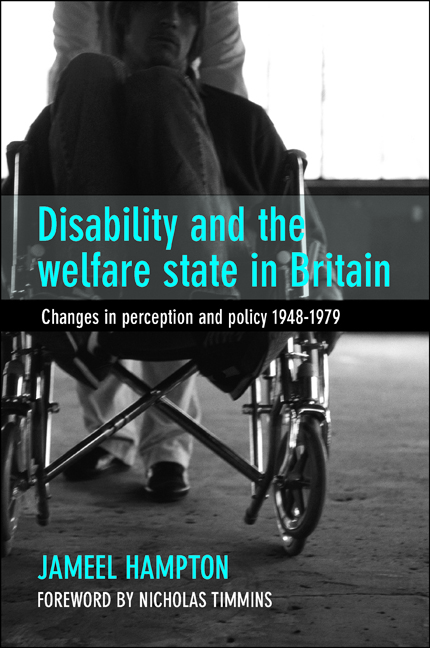Book contents
- Frontmatter
- Contents
- List of tables
- List of acronyms
- About the author
- Acknowledgements
- one Introduction
- two The old regime: provision for disabled people before the welfare state
- three Promotional welfare, 1948–63
- four The emergence of disabled people, 1964–69
- five Cinderella of the welfare state: legislation for disabled people, 1970–72
- six The final days: disability at the end of the welfare state, 1973–79
- seven The last waltz: epilogue
- eight Conclusions
- Appendix: Ministerial periods of office
- Bibliography
- Index
eight - Conclusions
Published online by Cambridge University Press: 01 September 2022
- Frontmatter
- Contents
- List of tables
- List of acronyms
- About the author
- Acknowledgements
- one Introduction
- two The old regime: provision for disabled people before the welfare state
- three Promotional welfare, 1948–63
- four The emergence of disabled people, 1964–69
- five Cinderella of the welfare state: legislation for disabled people, 1970–72
- six The final days: disability at the end of the welfare state, 1973–79
- seven The last waltz: epilogue
- eight Conclusions
- Appendix: Ministerial periods of office
- Bibliography
- Index
Summary
Notwithstanding the great expansion of statutory welfare during and immediately following the Second World War, cash and services for disabled people received little consideration from Beveridge, government ministries, and both major political parties. This omission was in part because of the widely held conviction that the majority of their welfare should be the responsibility of other providers within the mixed economy of welfare: formal non-statutory organisations, and families, friends and communities. Yet there was the concurrent belief that Britain was on a ‘collective train’ into the future; for those for whom democratic socialism was not the explicit goal, this meant ‘more equality’ or ‘fairness’. Disabled people boarded in the late 1950s. Both major parties, the Ministry of Health, the media, academics and the House of Commons became aware of their existence, and that they, as a coherent group, had been an oversight of the postwar settlement.
Along with the activities of the DIG, major social changes compelled the government to act in the mid and late 1960s: traditionally marginalised groups were seen less as moral failures; real and perceived affluence made it more possible to address unmet need and to concentrate on more particular social problems; the long-existing divide between ‘deserving’ and ‘undeserving’ poor was questioned; and it was recognised that the welfare state was failing to help some of the groups in most need. In the early 1970s, disabled people were part of the ‘revolution of expectation’ – a period where concrete results were demanded after disadvantaged PSS groups had gained recognition in the excitement of the 1960s.
But perception always raced ahead of policy. The responses of the state and both major political parties to these pressures and trends was not generated by a coherent philosophy. DIG, at a time when pressure groups were particularly powerful, sought to embarrass the governments of the period, both at home and abroad. By the 1974 elections, there were electoral consequences for not offering new provision for disabled people, and this once unknown group was courted by both parties. One should also not ignore the genuine compassion for the less fortunate that drove efforts for further provision in a period where it was generally believed that the state could and should solve social ills.
Throughout the welfare state, statutory welfare for disabled people remained largely determined by their comparative exclusion from the settlement of the 1940s.
- Type
- Chapter
- Information
- Disability and the Welfare State in BritainChanges in Perception and Policy 1948-79, pp. 237 - 246Publisher: Bristol University PressPrint publication year: 2016



